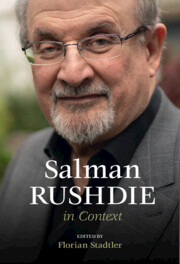Book contents
- Salman Rushdie in Context
- Salman Rushdie in Context
- Copyright page
- Dedication
- Contents
- Contributors
- Acknowledgements
- Introduction
- Part I Life
- Part II Literary and Creative Contexts
- Part III Historical and Cultural Contexts
- Chapter 10 Salman Rushdie and History
- Chapter 11 Religious and Ideological Mythologies in Salman Rushdie’s Novels
- Chapter 12 Revisiting the City in Rushdie’s Fiction
- Chapter 13 Nationalism and Transnationalism in Salman Rushdie’s Novels
- Chapter 14 Rushdie and Globalization
- Chapter 15 Salman Rushdie and Diasporic Identities
- Chapter 16 Rushdie and Secularism
- Chapter 17 Orientalism, Terrorism, and Counterinsurgency in Salman Rushdie’s Novels
- Chapter 18 Salman Rushdie’s Upwardly Mobile, Globally Migrating Middle Classes
- Chapter 19 Scheherazade and Her Cousins
- Chapter 20 Filmi Contexts
- Chapter 21 Salman Rushdie and World-Historical Capitalism
- Chapter 22 The Anthropocene and Ecological Limits in the Works of Salman Rushdie
- Part IV Critical Theoretical Contexts
- Part V Reception, Criticism, and Adaptation
- Works by Salman Rushdie
- Select Bibliography
- Index
Chapter 14 - Rushdie and Globalization
from Part III - Historical and Cultural Contexts
Published online by Cambridge University Press: 23 March 2023
- Salman Rushdie in Context
- Salman Rushdie in Context
- Copyright page
- Dedication
- Contents
- Contributors
- Acknowledgements
- Introduction
- Part I Life
- Part II Literary and Creative Contexts
- Part III Historical and Cultural Contexts
- Chapter 10 Salman Rushdie and History
- Chapter 11 Religious and Ideological Mythologies in Salman Rushdie’s Novels
- Chapter 12 Revisiting the City in Rushdie’s Fiction
- Chapter 13 Nationalism and Transnationalism in Salman Rushdie’s Novels
- Chapter 14 Rushdie and Globalization
- Chapter 15 Salman Rushdie and Diasporic Identities
- Chapter 16 Rushdie and Secularism
- Chapter 17 Orientalism, Terrorism, and Counterinsurgency in Salman Rushdie’s Novels
- Chapter 18 Salman Rushdie’s Upwardly Mobile, Globally Migrating Middle Classes
- Chapter 19 Scheherazade and Her Cousins
- Chapter 20 Filmi Contexts
- Chapter 21 Salman Rushdie and World-Historical Capitalism
- Chapter 22 The Anthropocene and Ecological Limits in the Works of Salman Rushdie
- Part IV Critical Theoretical Contexts
- Part V Reception, Criticism, and Adaptation
- Works by Salman Rushdie
- Select Bibliography
- Index
Summary
This chapter considers the ways in which Rushdie’s fiction engages with globalization, a process that intensified in the 1990s and which became a central theme in his fiction from The Moor’s Last Sigh onwards. This is especially pressing in Rushdie’s work in considerations of the global circulation of peoples, goods, and cultural productions, most pertinently explored in The Moor’s Last Sigh, The Ground Beneath Her Feet, and Fury. Focusing both on the aesthetics of these novels and their wider cultural contexts, I argue that Rushdie’s post-fatwa novels showcase a shift in his view of the transglobal world, which can be traced on three levels: the portrayal of space, the role attributed to creativity, and the emotional response globalization elicits.
- Type
- Chapter
- Information
- Salman Rushdie in Context , pp. 182 - 192Publisher: Cambridge University PressPrint publication year: 2023

